
 |
|
|
#1 |
|
Member
Join Date: Aug 2006
Location: Belgium
Posts: 171
|
I found this bow and arrows this morning on a fleemarket. It's made of some kind of bamboo, the arrowpoints are forged. I doesn't look african to me. It looks old and used but could also be some touristic thing.
The bow is 122 mm and the arrows 65 mm long. Any idee about origin and or age? |
|
|

|
|
|
#2 |
|
Member
Join Date: Dec 2004
Location: Italia
Posts: 1,243
|
Hi Congoblades, a very beautiful bow and arrows!!! No touristic stuff at all!!! I see on the book "Waffen aus Zentral Afrika" and i have attached a picture of an arrow that seems like yours: on the book is called Manyeme (see map). For the bow you can see on this site:
http://anthro.amnh.org/anthro.html you can see many bows on the section African Ethnographic Collection and than digit the word bow. I think that is congolese for the way the cord (it's sinew?) is attached to the bow, but anyway take a look. Congratulations 
|
|
|

|
|
|
#3 |
|
Member
Join Date: Dec 2004
Location: Italia
Posts: 1,243
|
Also this is Manyema
|
|
|

|
|
|
#4 |
|
Member
Join Date: Jan 2006
Location: Kent
Posts: 2,653
|
Hi Congoblades,
I think you are probably right that the bow and arrows are not African. The arrowheads are very interesting.... the forged heads seem a little unusual (for Africa, but I wouldn't be surprised if they are) in their design. The heads look to be to heavy for the length of arrow shaft and fletching. Because of the barbs are quite large and would affect the trajectory/path of the arrow, the fletchings (feathers) are usually larger to counteract this ...so as to help stabilise its (the arrows) flight. The size of heads and design suggests their use is to hunt larger animals.....or perhaps they are 'war' arrows. Although bamboo is a good material to use for the bow, I feel that it is not thick enough to give enough power to send these arrows too far. This suggests that you could get close to your prey......so the type of terrain would probably be woodland, forest, jungle etc. .....if hunting. Unfortunately, photos only tell part of the story........you really need to 'handle' these things to get a proper sense of a weight, power of the bow etc. I really like these sort of items.......I especially like the arrowheads you posted.....Sorry I cant give you a 'proper' answer.......just a few observations which may or may not help. Hi Flavio, what good information.......but notice the relative length of the arrows......Congoblades are much shorter, head design....very similar. |
|
|

|
|
|
#5 |
|
Member
Join Date: Aug 2006
Location: Belgium
Posts: 171
|
The seller mentioned Indonesia? but on a fleemarket they enything wrong or wright, is this possible? Indonesia?
Flavio, the "cord" is also from bamboo, just the ends are attached with a cord on the bow. I have many arrows from africa but never made of bamboo, maybe there are such from africa but I didn't see any so far  Katana, I dare not stretch the bow, maybe it will break, otherwice I would give it a try 
|
|
|

|
|
|
#6 |
|
Member
Join Date: Dec 2004
Location: Italia
Posts: 1,243
|
Congoblades, the two that i have posted they have the shaft made of reed. Maybe yours is not bamboo, but simple cane? Anyway many arrows in Africa show shaft made of cane. Also could be that the bow and the arrows came from different parts of the world, and more, could be that both aren't african because, since a bow is strictly related to the function that it has, the material and the shape could be very close in distant and different parts of world.
|
|
|

|
|
|
#7 | |
|
Member
Join Date: Aug 2006
Location: Belgium
Posts: 171
|
Quote:
Reed and cane, translating these gives me the same answer for both? Greets Guy |
|
|
|

|
|
|
#8 |
|
Member
Join Date: Dec 2004
Location: Italia
Posts: 1,243
|
Yeah, Congo, cane and reed are the same (Phragmites communis = Arundo phragmites). The plants that grow along the rivers or in the swampy zones

|
|
|

|
|
|
#9 |
|
Member
Join Date: Jan 2006
Location: Kent
Posts: 2,653
|
I've been checking on bamboo.... it seems that it is only available in sub-Saharan regions, if African .....this is the area to look. Asian areas it is prolific, so I tend towards S.E.A as a likely source. My understanding is that many African arrowheads are fixed to thin diameter reed which,is in turn, fixed to the main arrow shaft. However, I do not not know whether this is common to all African arrows........ I still think this is a nice item.
|
|
|

|
|
|
#10 | |
|
Member
Join Date: Jan 2006
Location: Kent
Posts: 2,653
|
Quote:
|
|
|
|

|
|
|
#11 |
|
Member
Join Date: Jan 2006
Location: Kent
Posts: 2,653
|
This is a similar match.....India 1900's
ASIAN ETHNOGRAPHIC COLLECTION Culture: INDIAN Country: INDIA Material: BAMBOO, CORD, METAL, THREAD, FEATHER Dimensions: A) L:75.2 W:10 H:1.8 B) L:53 W:3 H:2.2 C)L:49 W:2.5 H:2 [in CM] Donor: MISSIONARY Acquisition Year: 1900 |
|
|

|
|
|
#12 |
|
Member
Join Date: Dec 2004
Location: Sint-Amandsberg (near Ghent, Belgium)
Posts: 830
|
Hi Guy,
Nice bow, you found. Where exactly was that fleamarket ?   I tried to find something on African bows in my books, but it isn't easy. I can only say that rattan is often used for making bowstrings. Some months ago, I acquired a bow in Amsterdam. It's a small one, measuring only 84 cm. It's made from wood with some rattan weaving on both ends and in the middle. I was able to identify this piece by the two 'knobs' on the end of the bow. These are also made of wood and are used to hold the bowstring. According to 'Dodelijk mooi' (deadly beauty/beauté fatale) this bow originates with the Luba people in Congo. 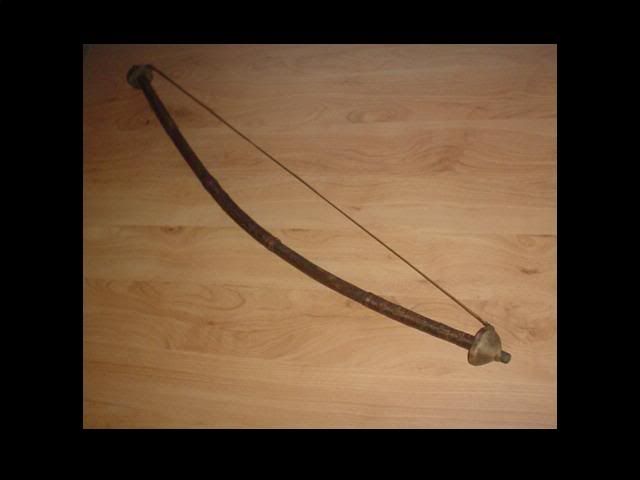 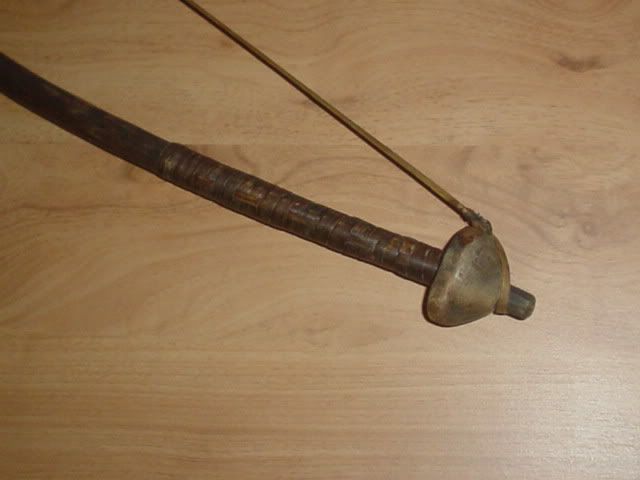 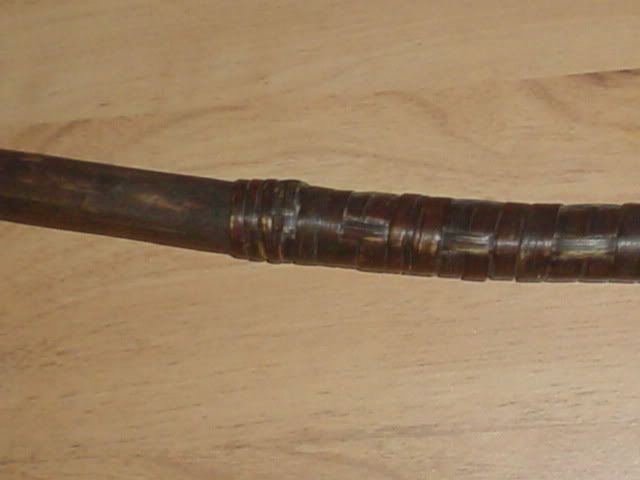 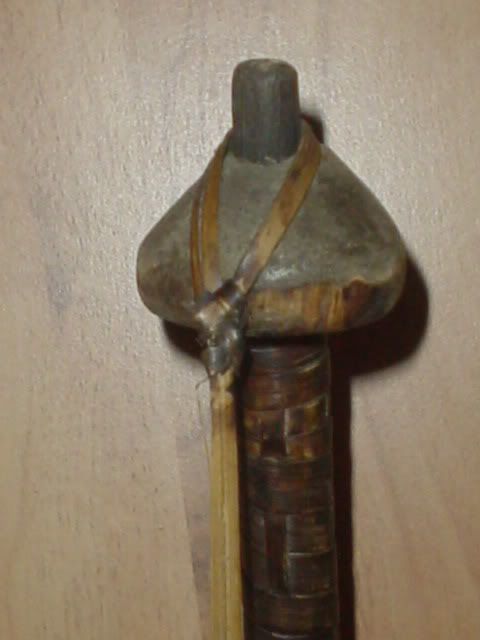
|
|
|

|
|
|
#13 |
|
Member
Join Date: Dec 2004
Posts: 1,247
|
Neat find!
Time to clear some issues up: yes, cane and bamboo are both members of the grass family (Poaceae). Yes, there are several canes: Arundo donax is the giant reed that is used to make the reeds for saxiphones and clarinets, while Phragmites communis is another reed. Both are used for arrows, although Phragmites might be the more widely used of the two. There are certainly other reeds, bulrushes, etc, but they aren't germane here. It is possible to make a bow out of reeds, but that's not what you have here. If you want to see a bow made from reeds, pick up The Traditional Bowyer's Bible, Volume 1 Bamboos grow all through the tropics: they're a large group of species, and a number of different species are useful for arrows. Rather fewer are useful for bows, mostly because bamboo tends to splinter under stress (I know, from having broken a friend's bamboo berimbau--a berimbau is a musical bow). The bamboo used for the bow here was definitely from a large species. It makes me think of one of the big Asian timber bamboos (Dendrocalamus), although I can't think of a way short of using DNA technology to figure out what species it is. I'm not an expert, but African bows tend to have a pretty distinctive way of binding the string. Rather than using loops on both ends (as here), many tribes run the string over (or through) the tip of the bow, then spiral the string down the shaft and tie it off after several turns (example). That's not what we see here. While I can't positively eliminate an African origin, to me the construction of the bow is Asian. There's an outside chance that the set is from south Indian (based on the shape of the arrowheads), I tend to think it's from South East Asia, somewhere between the eastern Himalayas and Borneo. This is based on the way the bow is built (typically Eurasian, with a woven, spliced bowstring and shoulder knocks) and the bow material (bamboo). Cane arrows are found all over the world, so the arrow material isn't very diagnostic. My 0.02 cents, F |
|
|

|
|
|
#14 |
|
Member
Join Date: Jan 2006
Location: Kent
Posts: 2,653
|
Hi Fearn, long time...no hear
I think we are 'in agreement' about this particular bow and arrow 'set'. I have not seen , so far, an African bow constructed of bamboo.....often bamboo is used as a laminate with other woods......my experiance still points to Asia ....where bamboo (self bows- a bow constructed of one material) were fairly common. |
|
|

|
|
|
#15 | |
|
Member
Join Date: Aug 2006
Location: Belgium
Posts: 171
|
Quote:
 , just joking, just another small market with only few standholders because of the rainy wether, normaly not worth going there, but you never know , just joking, just another small market with only few standholders because of the rainy wether, normaly not worth going there, but you never know  and this one was near my door in Gijzegem... and this one was near my door in Gijzegem...
|
|
|
|

|
|
|
#16 |
|
Member
Join Date: Dec 2004
Location: Italia
Posts: 1,243
|
Yeah, Katana, maybe is more asian than african...
Hello Freddy, i have a bow that is like yours, but if you see on Waffen aus Zentral Afrika this kind of bow are attributed to the Yaka (see attached).  Could you post a picture of the 'Dodelijk mooi'? Could you post a picture of the 'Dodelijk mooi'? Thank you Fearn! |
|
|

|
|
|
#17 |
|
Member
Join Date: Jan 2006
Location: Kent
Posts: 2,653
|
Freddy and Flavio....nice bows.....are the weavings on the bow limbs decoration or do they add to the strengh of the bow? The circular end pieces are unusual ...and would surely affect the 'cast' (spring action) of the bow......do you think they may act as some sort of 'balance weight'?, decoration? or what...?
|
|
|

|
|
|
#18 |
|
Member
Join Date: Dec 2004
Posts: 1,247
|
Thanks Katana,
Right now I'm on a phone line, and it took so long for the images to load that I didn't see your Indian bow image until well after my answer was posted. We definitely agree on the origin. I'm interested in Flavio's African bow too. I'd guess that a weight at the end of the bow would slow the arms down, lessening the distance the arrow traveled. However, I don't think that African bowyers are stupid, so I'm trying to figure out what else those "mushroom ends" could do, functionally. Are those ends part of the bow, or are they separate bits of wood? F |
|
|

|
|
|
#19 |
|
Member
Join Date: Feb 2005
Location: Chicago area
Posts: 327
|
The bow looks like it's made of palm wood. Springing when new but brittle when it gets old. I'd guess Indonesian.
|
|
|

|
|
|
#20 |
|
Member
Join Date: Dec 2004
Location: Sint-Amandsberg (near Ghent, Belgium)
Posts: 830
|
Flavio, here's the pic from 'Dodelijk mooi'. I hope it's clear enough.
On the drawing you can see the different types of fastening used in Congo. 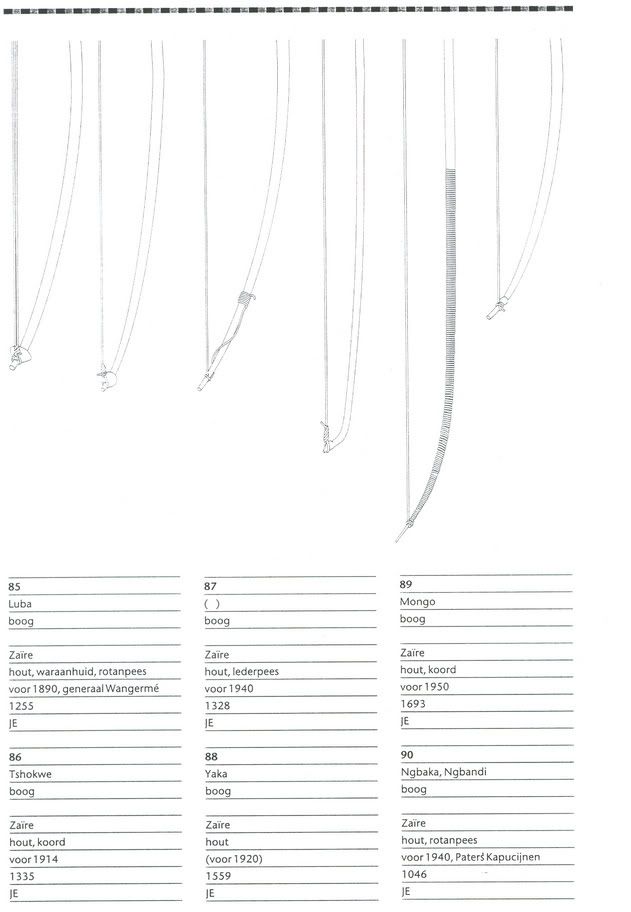
|
|
|

|
|
|
#21 |
|
Member
Join Date: Dec 2004
Location: Italia
Posts: 1,243
|
Thank you Freddy

|
|
|

|
|
|
#22 | |
|
Member
Join Date: Aug 2006
Location: Java, Indonesia
Posts: 49
|
Quote:
 . .I had seen the bow from Kalimantan, papua, Sunda. Thought by me your bow was different did not come from this area. Hope this help. |
|
|
|

|
|
|
#23 | |
|
Member
Join Date: Aug 2006
Location: Belgium
Posts: 171
|
Quote:

|
|
|
|

|
 |
|
|